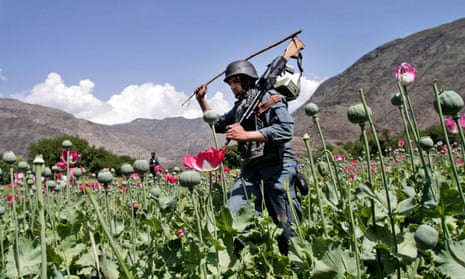Reform of international drug control is urgently needed. The war on drugs has left a trail of suffering and criminality in its wake and has manifestly failed to achieve its objectives. The UN special session of the general assembly (Ungass) this week presents an opportunity. Many reformers put drug users at the centre of changes to international drug policies, but the people growing the plants producing the substances they consume are often overlooked.
Farmers’ livelihoods and their communities’ sustainable development are inherently linked to reform of international drug policies. For hundreds of thousands of farmers’ families, existing crop control laws and practices cause conflict and poverty (pdf), and crush hopes for economic improvement.
In January, representatives of cannabis, opium poppy and coca cultivating communities, from 14 countries, gathered in the Netherlands to discuss global drug control policies and the urgent need for reform (pdf). They soon discovered they had more than livelihoods in common.
Many had experienced criminalisation, forced eradication of their crops, and conflicts over land. They shared experiences of how drug policies stigmatise and brutalise farmers. But they also came with clear proposals to protect their rights and advance a viable and sustainable economic future for their communities.
Their demands were gathered together in the Heemskerk declaration, which will be brought to Ungass to make sure the voices of farmers are heard. Dionicio Nuñez Tangara, a farmers’ representative from Bolivia, said the declaration is a demand “that all countries meeting at Ungass 2016 will hear the people and listen to the voices of thousands, millions of farmers of prohibited plants”.
In many countries, farmers’ communities live with absent or inadequate government services, as policymakers divert scarce resources to repress the drugs market while healthcare, education and public services are neglected. Where access to modern healthcare is limited, cannabis, opium and coca are often used for their medicinal qualities, which some countries legally recognise, but prohibition of these substances means alternative healthcare becomes less accessible too.
Development assistance has largely failed to help the cultivating communities too. Aid often comes with strings attached, and schemes open to growers of prohibited crops are no exception. Farmers are told their crops must be destroyed if they are to access such projects, leaving them with no source of income: they can take one step forward, but not before taking two steps back.
None of the participants in the Heemskerk meeting had been able to benefit from alternative development or other forms of assistance, either because they simply did not exist or because the programmes were ineffective. Communities have rarely been involved in the planning and execution of programmes supposedly designed to benefit them.
Worse, the methods used to eradicate their livelihoods are notoriously damaging. Wilder Mora Acosta, from Colombia, told the forum: “The environment suffers, water is contaminated and fish die.” Forced eradication of crops produced by small farmers is contrary to human rights. It causes conflict and environmental degradation. Wiping out a farmer’s livelihood increases poverty and can lead to displacement. “Families lose 70% of their incomes,” said Sai Lone, another participant, from Myanmar.
Why then do farmers persist in growing forbidden crops? Cultivation is often tied to traditional, ceremonial and medicinal practices. In other cases, there simply is not much choice: where land or infrastructure is not suitable for cultivation of other crops, farmers often grow prohibited plants because the alternative is poverty.
So what do growers of prohibited plants want? They simply ask to be able to live off the land. They accept alternative forms of livelihoods, provided traditional uses are respected. They call for a holistic approach to drugs that protects human rights, encourages licit use of crops for traditional uses, and prioritises sustainable development. Like many civil society organisations and policymakers, they reject prohibition and the war on drugs. No plant should be a controlled drug under UN conventions or national legislation.
Crucially, they demand that affected communities should be involved in all stages of drug policies and development, from design to implementation and evaluation. They argue that the only durable way to tackle poverty and reduce harm from drugs must be based on the promotion and protection of the livelihoods of small-scale farmers and rural workers, and guaranteed access to and control over land and common goods.
The war on drugs has failed and will continue to do so unless all stakeholders are included in policymaking. Producers have mapped out a reasoned approach to an issue that has been characterised by moralistic, unscientific approaches and a total failure to address the needs of those involved in the production of prohibited plants. If Ungass fails to make any other real progress, let it at least signal the beginning of the end of the war on drugs.
- Pien Metaal is a researcher at Transnational Institute, a thinktank in Amsterdam
